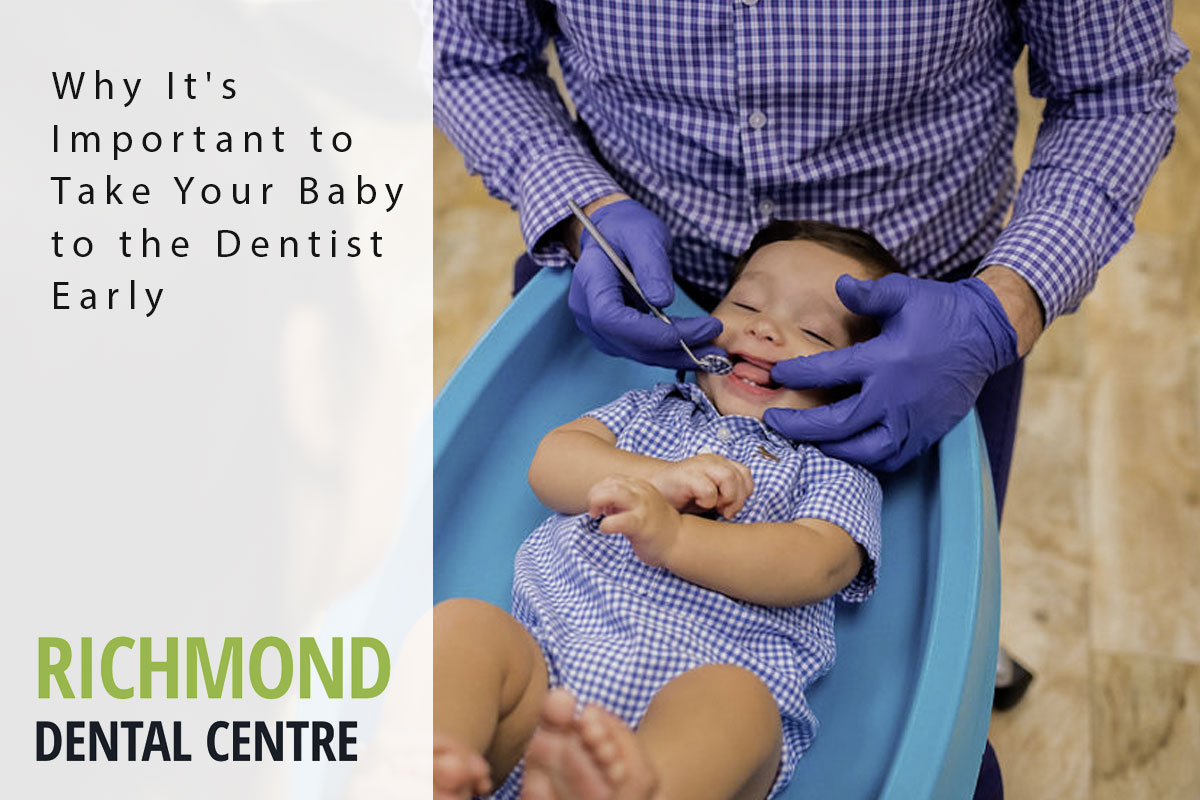Parents aim to provide their babies with a strong start in life, which includes prioritizing their oral health. Early dental visits for your baby play a crucial role in establishing good oral hygiene practices, preventing future dental issues, and helping your child become comfortable with dental visits. This article explores the importance and benefits of these early dental check-ups. Join us in setting your child on the path to a lifetime of healthy smiles.
The benefits of early dental visits for babies
Early dental visits for babies offer several important benefits, including:
- Prevention of Tooth Decay: Early visits allow the dentist to monitor your baby’s oral health and provide guidance on proper cleaning techniques. This helps prevent tooth decay and cavities.
- Early Detection of Oral Health Issues: Dental check-ups can identify any potential oral health problems early, such as developmental issues or alignment concerns.
- Education for Parents: Parents receive valuable information about oral care for their infants, including teething advice, proper cleaning methods, and dietary recommendations.
- Acclimation to Dental Environment: Regular visits help familiarize babies with the dental office, reducing anxiety and fear associated with future appointments.
- Guidance on Thumb-Sucking: Dentists can offer guidance on addressing habits like thumb-sucking, which may impact oral development.
- Establishing Good Oral Hygiene Habits: Early visits set the foundation for a lifetime of good oral hygiene practices, promoting healthy teeth and gums.
- Overall Health Connection: Healthy teeth and gums in infancy can contribute to better overall health as children grow.
- Preventing Emergency Situations: Early dental care can help prevent dental emergencies that may arise from untreated issues.
When to schedule the first dental visit for your baby
Dentists recommends the first visit within six months of the first tooth eruption or by the age of one, whichever comes first. This milestone signals the need for proactive oral care and early issue detection. Even if your baby has no teeth, consulting a dentist is essential for guidance on oral care.
What to expect during a baby’s first dental visit
As a parent, you might be curious about what to expect during your baby’s first dental visit. This initial appointment serves as a gentle introduction to the dental environment. Here’s what you can anticipate:
- Warm Welcome: The dental team will warmly greet you and your baby, fostering a friendly atmosphere. They’ll take time to know your baby and address any questions or concerns.
- Oral Examination: The dentist will carefully examine your baby’s mouth, checking for tooth decay, gum health, and other oral issues using a mirror and small instruments.
- Oral Hygiene Guidance: You’ll receive advice on cleaning your baby’s teeth and gums, with a focus on proper oral care techniques, suitable toothbrushes, and toothpaste.
- Diet and Nutrition: The dentist may discuss how diet and nutrition impact your baby’s oral health, recommending healthy food choices and discouraging sugary snacks and drinks.
- Fluoride Application: If necessary, the dentist may apply fluoride varnish to protect your baby’s teeth and strengthen enamel, preventing cavities.
- Future Appointments: You’ll discuss the recommended frequency of future dental visits for your baby, ensuring their ongoing oral health.
Remember, the first dental visit benefits both your baby’s oral health and your knowledge as a parent, providing guidance from professionals specialized in treating infants and young children.
Tips for preparing your baby for their first dental visit
Preparing your baby for their initial dental visit can promote a positive and stress-free experience. Here are some helpful tips to make you and your baby more at ease:
- Start Early: Begin introducing your baby to oral care from an early age. Even before their first dental visit, incorporate gentle gum cleaning into their daily routine using a soft, damp cloth after feedings.
- Choose the Right Time: Schedule the appointment when your baby is well-rested and generally in good spirits. Avoid nap times, and make sure your baby isn’t hungry or tired.
- Play Dentist at Home: Familiarize your baby with the idea of someone looking in their mouth by playing dentist at home. Use a small mirror and gentle touches to mimic what the dentist might do during the visit.
- Read Books or Watch Videos: Utilize children’s books and videos that introduce the concept of visiting the dentist in a fun way. Reading or watching these together can help ease any anxiety or fear.
- Stay Calm and Positive: Your baby can sense your emotions, so maintaining a calm and positive demeanor during the dental visit is crucial. Your reassurance and encouragement will make the experience pleasant.
- Bring Comfort Items: If your baby has a favorite toy or blanket, bring it to the dental appointment. Familiar items provide comfort and security.
Conclusion: The lifelong impact of early dental visits for babies
Early dental visits for babies can profoundly impact their lifelong oral health and overall well-being. By instilling strong oral hygiene habits and addressing potential dental concerns from the start, you pave the way for a lifetime of healthy smiles. These early visits offer preventive measures against tooth decay, the early identification of oral health issues, and guidance on teething and thumb-sucking. They not only benefit your baby but also provide essential education and support for parents in caring for their child’s oral health. Remember, schedule the first dental visit within six months after the first tooth emerges or by the age of one, ensuring a proactive approach to your baby’s long-term oral health and establishing a dental home for their future needs. Don’t delay; start early for a lifetime of healthy smiles. Book at appointment today with the Richmond Dental Centre by calling (604) 273-3368.







